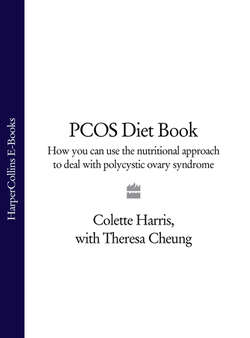Читать книгу PCOS Diet Book: How you can use the nutritional approach to deal with polycystic ovary syndrome - Theresa Cheung - Страница 46
How?
ОглавлениеNuts, seeds, olive oil, avocado, flaxseed oil and oily fish (mackerel, salmon, herrings and sardines) are rich in essential fatty acids. Aim to eat fish at least twice a week, and nuts and seeds (flax, sunflower, pumpkin, hemp, sesame, almonds, cashews, walnuts) daily, maybe as a snack between meals, take flax oil by the tablespoon or in salad dressings, add hempseed oil to smoothies, or use sesame oil with stir-fries.
Omega-3 fatty acids are far less common than Omega-6 fatty acids in our modern diets. Omega-3 fatty acids are found in the oils of cold-water fish as well as in some seeds (including hemp seeds and pumpkin seeds) and in walnuts. Omega-6 fatty acids are in many foods, especially nuts, seeds, vegetable oils (such as sunflower, soy, walnut, sesame, olive, coconut and peanut oil) and legumes. The two types of fat are not interchangeable; you need to consume both and keep them balanced.
If you don’t eat fish, flaxseed oil or flax seeds (also known as linseeds) are excellent sources of Omega-3: 7 grams of flaxseed oil are equivalent to 1 gram of fish oil. Try a daily dose of 3 heaped teaspoons of cold-pressed flaxseed oil or three tablespoons of ground flax seed. Hempseed, pumpkin seed or soybean oil are also good sources. Use only cold-pressed vegetable oils; the bottle should say ‘unrefined’, ‘unhydrated’ or ‘cold-pressed’. Alternatively, grind 1 tablespoon of seeds and mix it into cereals or sprinkle over salads. Sea vegetables (edible seaweed, kelp, etc.) and green leafy vegetables are also good sources.
It’s best to avoid refined and processed foods, as they contain substances which can block the absorption of EFAs, and limit your intake of excess fatty foods from animal sources such as lamb and pork, high-fat cheeses and cream. Animal fats contain a substance that encourages blood-clotting and inflammation – thus they can exacerbate eczema or other inflammatory conditions. Game is less fatty, as are white meats, poultry and fish. Steer clear of factory-farmed poultry, which often contains hormones and antibiotics that can upset your hormonal, immune and digestive systems.
You don’t need to avoid animal fat completely, simply keep it to a minimum, but do avoid vegetable oils in the form of the fried, oxidized or hydrogenated fats found in margarine, vegetable shortenings and fast-food french fries. The ‘transfatty acids’ found in many processed foods, margarines, baked goods and takeaway fries, as well as cereals, peanut butter, mayonnaise and snack foods, should be avoided because they can increase the risk of diabetes, according to research by the New England Journal of Medicine. These can also be called hydrogenated fats or oils on labels.
To sum up: Reducing the amount of red meat you eat in your diet to three meals or fewer a week, switching to extra-virgin olive oil, increasing your intake of oily fish to three portions a week, eating more vegetarian meals and snacking sensibly on mixed nuts and seeds during the day rather than crisps or sweets are all easy ways to ensure correct and healthy fat consumption.
